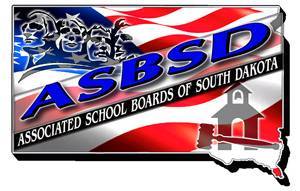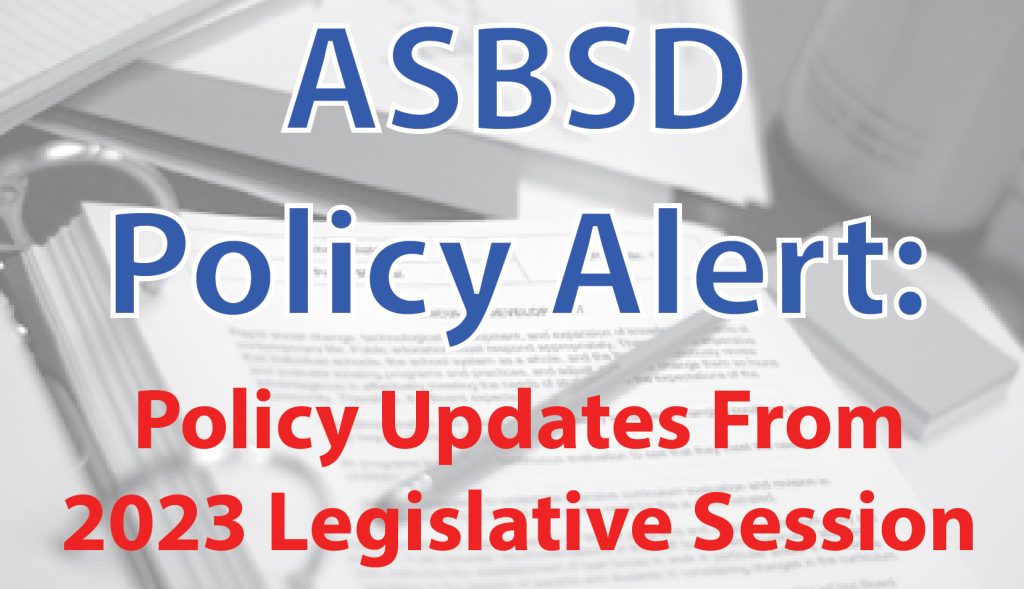ASBSD has updated a few policies related to laws passed by the legislature during the 2023 session.
“We have put together a recap of the bills passed and signed into law from the 2023 Legislative Session with a relevant impact to policy and other areas in South Dakota public schools,” ASBSD Policy and Legal Services Director Jessica Filler said.
To view the bills, click on the blue links below.
SB 162: Revise certain provisions regarding public comment at board meetings.
Summary: Expands SDCL 1-25-1 to require public comment at all board meetings, unless the meeting is held only for the purpose of meeting in executive session.
Legal/Practice Impact: Public comment must be allowed at all official board meetings (regularly scheduled, board training, special meetings, etc.) unless the meeting is held solely for the purpose of meeting in executive session. This new law also allows boards to limit the time for each topic during public comment and the total time allowed for public comment. The practice impacts are that all board meetings must allow for public comment, unless the purpose of the meeting fits a rare exception contained in statute.
Policy Impact for School Boards: ASBSD has modified its sample policy BD, School Board Meetings, to reflect the change in the law regarding when Boards must allow public comment.
HB 1060: Revises certain procurement provisions.
Summary: This bill modifies SDCL Ch. 5-18A to increase the dollar amount threshold from $25,000 to $50,000 for which supplies and services must be bid out.
Legal/Practice Impact: If a school intends to purchase supplies or services that are $50,000 or more, schools must advertise for bids or proposals. Schools are able to establish their own procedures for procurement of services and supplies under $50,000.
Policy Impact for School Boards: ASBSD has changed its sample Policy DJ: Purchasing Procedures and Policy DJC: Bidding Requirements to reflect this increased dollar amount.
SB 182: Establishes a uniform method for calculating high school credit received from completing postsecondary courses.
Summary: This bill adds language to SDCL 13-28-37 regarding high school students taking college-level courses, specifically that the Board of Education Standards must establish by administrative rules a uniform method for school districts to calculate the amount of high school credit that a student receives for completing a postsecondary course.
Legal/Practice Impact: The SD Department of Education is currently going through the rule- making process to create administrative rules in order to comply with this law that requires the establishment of uniform method to calculate high school credits for students who complete college-level courses while they are still in high school.
Policy Impact for School Boards: ASBSD likely will amend its Policy IGCD: Advanced College Placement, after the SD DOE rules are finalized and become effective.
HB 1191: Clarifies the duties of truancy officers.
Summary: This bill clarifies SDCL 13-27-20 that truancy officers are obligated to make and file truancy complaints only for children who are enrolled in their school district.
Legal/Practice Impact: This bill clears up the question of whether truancy officers are responsible to make and file truancy complaints for children who resided in the school district but who were homeschooled.
Policy Impact for School Boards: Currently, ASBSD’s sample policy (JEDA: Truancy) encompasses the duties and responsibilities of truancy officers making and filing truancy complaints, so no change in the policy language is necessary.
SB 207: Provides a penalty to expend public funds to influence the outcome of an election.
Summary: This bill amends SDCL 12-27-20, making it a criminal Class 1 misdemeanor if a school board expends $1,000 or more in public funds (and a Class 6 felony if the expenditure is $10,000 or more) for the purpose of influencing the nomination or election of any candidate, or for the petitioning of a ballot question on the ballot or the adoption or defeat of any ballot question.
Legal/Practice Impacts: School boards should not expend or permit the expenditure of public funds to influence nominations or elections of candidates, or to petition for or against a ballot question. Importantly, the law allows an officer’s free speech in his/her personal capacity, and moreover the law does not prohibit schools from presenting factual information for the sole purpose of educating the voters on a ballot question.
Policy Impact for School Boards: None. ASBSD’s sample policies, GBGA: District Involvement in Political Activity, and KMI: Relations with Political Organizations, already prohibit the expenditure of public funds to influence elections or ballot measures.
HB 1123: Authorizes school boards to modify the length of terms for board members.
Summary: This amends SDCL 13-8-2 and SDCL Ch. 13-7 to allow school boards to increase the length of board member terms from three to four years or decrease the length of terms from three to two years for the purpose of holding joint elections with counties’ June primary election.
Legal/Practice Impacts: Board members’ terms cannot be increased or decreased unless the board conducts a public hearing. At the hearing, the board may approve a resolution or refer the matter to the voters. The board’s resolution is subject to a referendum to have the question placed on the ballot.
Policy Impact for School Boards: None; however it is suggested that schools consult with their legal counsel if they have questions regarding increasing or decreasing board members’ terms.
SB 76: Provides for licensure by endorsement for certain licensed professionals and occupations.
Summary: Includes teachers, administrators and other educational professionals to the licensure endorsement process contained in SDCL Ch. 36-1D.
Legal/Practice Impact: Teachers, administrators and other educational professionals licensed pursuant to SDCL. Ch. 13-42 are added to the list of occupations that can be issued a certificate to allow practice in this state upon the applicant satisfying certain conditions.
Policy Impact for School Boards: None.
SB 59: Appropriates $5,000,000 to the Department of Education for CTE grants.
Summary: The sum of $5 million was appropriated to the Department of Education for the purpose of providing grants to partnering schools or multidistricts for equipment for new or existing career and technical education programs, subject to certain requirements.
Legal/Practice Impacts: Applications for such grants will be accepted by DOE no later than June 30, 2024.
Policy Impact for School Boards: None.
SB 168: Authorizes school boards to adopt policies regarding students who are registered sex offenders.
Summary: Creates a new law codified at SDCL 13-28-53 allowing school boards to adopt a policy that requires a student who is a registered sex offender under our state law to receive instruction through remote or distance learning or an alternative educational program.
Legal/Practice Impact: School Boards may adopt a policy, if they choose, to require a student who has been adjudicated by the court and ordered to register as a sex offender to receive instruction through remote or distance learning or an alternative educational program. ASBSD recommends that schools discuss with their school attorney before applying such a policy to a student, in order to consider the circumstances and relevant factors and determine the appropriate placement for the child, especially in light of federal law and regulations including special education and related services.
Policy Impact for School Boards: ASBSD has amended its sample policy JFCL: Student Registered Sex Offenders. This sample policy allows an appeal of the school’s placement decision to the superintendent and school board, and puts the obligation on the parent/guardian to notify the school in the event their child is registered as a sex offender.
HB 1163: Requires a school board to adopt a policy related library materials and imposes a penalty if they fail to do so.
SB 193: Establish provisions related to the review and selection of instructional materials.
Summary: SB 193 would have required schools to have a policy with a procedure for the review and selection of instructional materials and allow for input from parents, and allow a parent to request administrative or board review of instructional material that the parent believes is harmful to minors or not age-or grade level appropriate. HB 1163 would have banned obscene material (as defined by statute) from being available to minors and would have required schools to adopt a policy outlining the method for an individual to report material he/she believes to be obscene and for the governing body to determine if the reported material is obscene, with a consequence of withholding public funds if the school fails to comply with such a policy.
Legal/Practice Impacts: None, since these bills did not become law. However, ASBSD believes all schools should have a policy regarding library materials that outlines the process of how library materials are selected and how school district complaints regarding library materials are processed. In addition, regarding changes in the curriculum, task forces and/or desires of parents and students could be taken into consideration.
Policy Impact for School Boards: For policies related to curriculum development and library materials, please see ASBSD’s sample policies: IIA: Instructional Materials; IIAC: Library Materials Selection and Adoption; IIAA: Textbook Selection and Adoption; IF: Curriculum Development; ABA: Community and Parent Involvement in Decision Making; INB: Teaching About Controversial Issues; KLB: Public Complaints About the Curriculum or Instructional Materials; and KLB-E(1): Public Complaints About the Curriculum or Instructional Materials-Request for Reconsideration of Instructional Materials.
To see the outcomes of other 2023 session bills affecting public education, please see ASBSD’s bill tracker: https://asbsd.org/services/billtracker-2/.
For questions related to the policies, contact Filler at jfiller@asbsd.org or at 605-773-2513.
To access the ASBSD Policy Services website, school board members and administrators must login at http://policy.asbsd.org. Your district’s login and password information has been previously provided to your district’s administration.
Note: For ASBSD member schools who are Online Policy Services subscribers you may access a PDF copy of the modifications made to these policies through your school districts online policy site, simply choose the ASBSD Communications option under the Policies tab.
If you are not able to access the ASBSD Policy Services website, please contact your district’s administration or ASBSD Policy Services Associate Kay Thompson-Tieszen at kay@asbsd.org.

